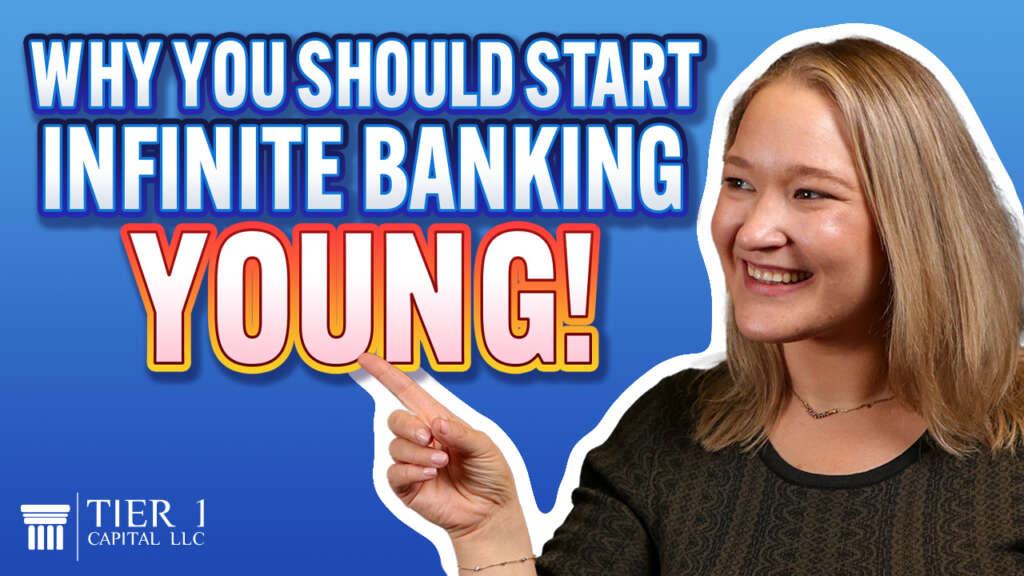
I got my first life insurance policy as soon as I graduated from college. Now, this may seem counterintuitive to some people because I had just graduated college, and I didn’t have a family. What need did I really have for life insurance at that time? Well, I use that policy as a savings account, a savings vehicle, so I can accumulate wealth and keep control of it without the risk of losing any money.
When I’m talking to people about getting started with the infinite banking concept or a specially designed whole life insurance policy designed for cash accumulation. What I always say is you should start where you are with whatever cash flow is manageable for you.
Now, there are some caveats in that, with making sure the policy can be properly designed. So typically, multiplying your age by ten is a good monthly basis for you. So if you’re 20 years old, that would be a premium of $200 per month.
Now, what’s the benefit of starting young? Well, the sooner you get started, the sooner you’re able to get into the habit of saving and compounding interest within your policy.
In the early years, the compounding was really not significant. But the reason you want to start sooner rather than later is because of the compounding effect on the back end. When you have this policy, in effect for 40 and 50 years, your compounding annual increases are going to be significant. The longer you put off starting. The more you’re going to punish yourself.
As a rule of thumb, you should be saving about 20% of your income on a monthly basis. These policies are a great way to set up systematic savings and get you in the routine of that money is automatically taken from your account and put in a place where it could grow, compound, and still be accessed for financing your own purchases.
When you start planning, you don’t have a need for death benefits, you have a need for cash. You’re planning for your future needs for cash, because as we always say, you finance everything you buy. You’re either going to control the process or be controlled by the process of financing.
You see, at the age of 22, I didn’t necessarily know what my financial goals were going to be down the line, but I knew I was able to access a portion of that cash value for whatever I needed. I used it to go on vacation with my friends and paid myself back. I used it to get out of credit card debt and pay myself back. I used it to knock down my student loans and built that cash value back up.
And the thing is, once you start taking policy loans to pay off these things and to finance these things of life, your cash value continues to grow. Because I’m already putting in premium deposits and growing and accumulating that cash value. But once I start taking money out and paying it back in, that’s also contributing to the accessibility of cash within my policy, versus if I was just to do the traditional method of paying off Visa. At the end of the day, I’d have nothing to show for it.
And keep this in mind, when I took that loan, I took it against the equity or the cash value of the policy. That money never left the policy, and consequently, it continued to earn uninterrupted compounding interest. Every time I made a payment it increased the availability of more equity that I could use for another loan for another life event.
You see, my policy is with a mutually owned whole life insurance company. Meaning, that I am part owner of that company as it relates to my policy. Also, they use non-direct recognition, Meaning the performance of my policy is going to be the exact same. Whether or not I take a policy loan against that cash value.
When I take a policy loan, the insurance company gives me a loan right out of the general account of the insurance company. And they place a lien against my cash value and the policy. And what that means is, as I repay the policy loan and that lien gets reduced, I have access to more and more cash value over time.
So the point is, I am in complete control of this process. And if I ever needed to stop making a monthly loan repayment to the policy, I could do it. If I wanted to double down, I could do that. If I wanted to cut the payment down, maybe in half, I could do that. The point is, I’m in control of the whole process. And that’s not a small distinction.
I would much rather be in control of the financing function in my life rather than be at the mercy of the banks and credit companies in order to be financially free. You see, whoever controls your cash and whoever controls your cash flow controls your life.
With a policy like this, you are in control of your life.
If you’d like to get started on your path to financial freedom, it’s never too early or too late to start. Be sure to schedule your Free Strategy Session today. We’d be happy to speak to you about your specific situation.
And remember, it’s not how much money you make it’s how much money you keep that really matters.
